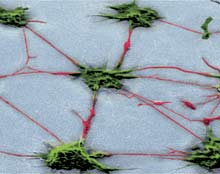Chip Makes Neurotoxicity Tests Quicker and Easier
Want to see how your brain looks on drugs? A new lab-on-a-chip device will show you.

The chip, called a network formation assay (NFA), should let researchers test compounds quicker and more reliably, making neurotoxicity tests easier and animal experiments less common. Although animal tests are still required by the FDA for drug development, improved in-vitro tests will mean that fewer toxic compounds make it to the animal-testing stage.
There is another reason researchers need better in-vitro screening techniques. Many European countries have already banned cosmetics testing on animals, while a European Union directive called REACH will require more frequent chemical tests.
“There are estimated to be around 30,000 chemicals that are not fully tested for their toxicological risk,” says Jonathan West a microengineer at the University of Dortmund in Germany, who developed the new chip with colleagues.
In-vitro neurotoxicity tests involve growing nerve cells and counting the number axons and dendrites that grow between them. This neural connectivity is a basic feature of normal brain function and underlies activities such as learning and memory. So its disruption is a reliable predictor of neurotoxicity. For example, acrylamide, a known neurotoxin, inhibits the formation of these connections. But such tests are usually time-consuming and unreliable because nerve cells end up randomly positioned, making it difficult to objectively assess the length of connections between them under a microscope.
West and colleagues Christoph van Thriel, Jan Hengstler, and Marcel Leist from the University of Konstanz, also in Germany, found a way to standardize the neurotoxicity test by fixing neurons in place at set distances from each other.
The new NFA chip is covered with a thin layer of a hydrophobic polymer–polydimethylsiloxane (PDMS)–etched with a hexagonal array of points where the underlying substrate is visible, says West. The PDMS is repulsive to extracellular matrix proteins, which cells normally use to bind to a surface. So cells automatically position themselves in the hexagonal array, where they can reach the substrate. This lets testers quickly assess if connections have formed between cells and precisely measure the length of these connections.
“It’s very clever,” says Kelly Bérubé, a cell biologist at the University of Cardiff, in Wales, and scientific advisor to the U.K. charity Safer Medicines Trust.
It normally takes about 10 hours to test a single compound–thirty times for 10 different doses. Using the new chip, West says, the process takes only a few hours.
“Companies are looking for something like this so they can quickly find molecules that are least toxic before moving on to animal tests,” says Bérubé. “You would save lots and lots of animals. This has to be the way to go.”
“I think this is very interesting,” says Dominic Wells, head of cellular and molecular neuroscience at Imperial College London. “There’s always been a problem of screening toxicological compounds, and this has the potential to be automated.”
West’s group is now looking at developing chips for testing other types of cells, including stem cells. Their research is published in the latest edition of the journal Lab on a Chip.
Keep Reading
Most Popular
Large language models can do jaw-dropping things. But nobody knows exactly why.
And that's a problem. Figuring it out is one of the biggest scientific puzzles of our time and a crucial step towards controlling more powerful future models.
The problem with plug-in hybrids? Their drivers.
Plug-in hybrids are often sold as a transition to EVs, but new data from Europe shows we’re still underestimating the emissions they produce.
How scientists traced a mysterious covid case back to six toilets
When wastewater surveillance turns into a hunt for a single infected individual, the ethics get tricky.
Google DeepMind’s new generative model makes Super Mario–like games from scratch
Genie learns how to control games by watching hours and hours of video. It could help train next-gen robots too.
Stay connected
Get the latest updates from
MIT Technology Review
Discover special offers, top stories, upcoming events, and more.